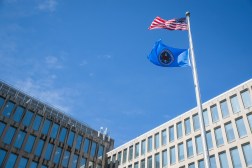Why is satisfaction so low among federal IT workers?
Federal IT personnel are less satisfied with their work than many of their peers, according to a ranking out this week, and several executives close to the federal IT community say senior leadership may be to blame.
Federal IT and cyber personnel reported a 56.2 percent satisfaction rate, nearly two points below the improved governmentwide score revealed in the Partnership for Public Service’s “Best Places to Work in the Federal Government” report, and a dozen points behind the most satisfied mission-critical occupation group of economists. PPS compiles its rankings annually from the Office of Personnel Management’s Federal Employee Viewpoint Survey data and other surveys it does on its own.
“Frankly these jobs are hard,” said Richard Spires, CEO of workforce training company Learning Tree. And because often agency leaders don’t prioritize their IT organizations, Spires said, “you have a dynamic where the morale is hard to keep up because people feel like ‘Wow, we’re doing all we know how to do, we’re constrained in what we can do, and we get beat up all the time because it’s hard to meet the customer’s demands.'”
A former chief information officer with the Department of Homeland Security and the IRS, Spires told FedScoop the results of the rankings didn’t surprise him because during his time as a federal CIO, he saw frustrated IT professionals all the time.
“A lot of times what I found was it was hard to get [IT workers] to stay on with the type of work we could offer and it be very meaningful for them,” he said. “They want to be working on modern technologies, cutting-edge things, new processes, and a lot of times that work just wasn’t there for them” in the legacy-system-saturated federal government.
The disconnect between the work of many IT professionals and the mission of their agency could affect their overall job satisfaction, said Sean Morris, a principal with Deloitte Consulting, which helped produce the rankings.
“The biggest mover at the end of the day is the same for any job type,” Morris said. “And that is how engaged are senior leaders in being able to communicate how what IT professionals do is linked to the mission of an organization. Often, your very senior leaders have a hard time translating down throughout the organization to different classifications.”
That shouldn’t be the case, though, he said, when massive data breaches, like the one announced at the Office of Personnel Management earlier this summer, are devastating agencies.
“If you look at some of the biggest challenges federal agencies have had over the last 12 to 24 months, they’ve actually been in the IT area, and specifically in the cyber area,” Morris said. “That’s just another example of needing to recognize those people that are actually protecting your organization to be able to do what it does or is supposed to do every day.”
Max Stier, president and CEO of the Partnership for Public Service, agreed. “We ought to be worried,” he told FedScoop. “IT is so important to the success of government agencies. It’s mission critical. And in a world in which we have cyberattacks, as well as the opportunity, on the upside, of improving performance through technology, the fact that IT professionals are demonstrating lower scores for satisfaction should be a warning sign for everybody.”
Stier said the top agencies in this year’s ranking — NASA is perennially the top large agency, and the Federal Deposit Insurance Corp. has owned the top spot for mid-size agencies — were successful because of a dedication from leadership to make sure employees are engaged and satisfied.
“What’s the most important quality represented here? A set of leaders who believe leadership really matters and leadership around focusing on employees,” Stier said. “And that’s not true across the board, and it needs to be.”
The rankings, Stier and Morris said, give struggling agencies models for success. Leaders having trouble keeping their IT personnel satisfied can look to the Social Security Administration and the General Service Administration, which ranked the highest in that category for large and mid-size agencies, respectively.
Is there a specific reason they’re more successful?
“The key is that leaders have to be held accountable for this,” Stier said. Leaders must focus on giving employees a positive work experience, he said. “If you don’t have that, almost nothing else matters.”






